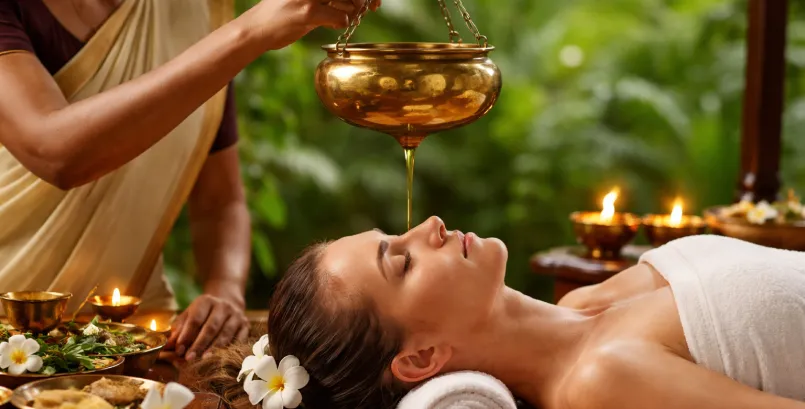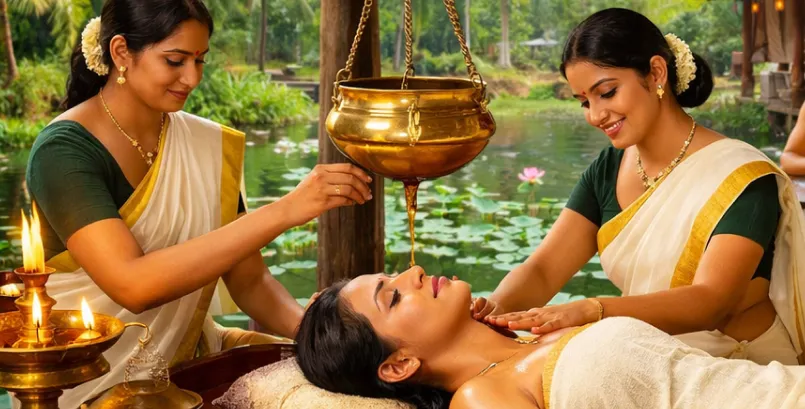
By Dr. Arun Radhesh R | October 24, 2023
Table of Contents
- What Are the Ayurveda Doshas? Vata, Kapha, and Pitta
- Vata dosha
- Pitta dosha
- Kapha dosha
- How do I know if I am Vata Pitta or Kapha?
- Yoga for Vata, Pitta, and Kapha
- How do you manage Vata Pitta Kapha?
- What is Pitta Kapha personality type?
- Physique of the Doshas
- Ayur WakeUp Ayurvedic Resort Kerala
- FAQs
What Are the Ayurveda Doshas? Vata, Kapha, and Pitta
Ayurveda is a traditional Indian system of medicine that has been used for centuries to treat a variety of conditions. Ayurveda is based on the belief that the human body is made up of three doshas, or energies: vata, pitta, and kapha.
Vata dosha
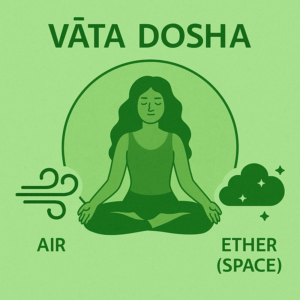
Vata is the dosha of movement and air. It is responsible for the nervous system, breathing, and circulation. Vata people are typically thin, energetic, and creative. However, they can also be anxious, restless, and have difficulty sleeping.
Pitta dosha

Pitta is the dosha of fire and transformation. It is responsible for digestion, metabolism, and body temperature. Pitta people are typically intelligent, ambitious, and driven. However, they can also be hot-tempered, competitive, and have difficulty relaxing.
Kapha dosha

Kapha is the dosha of water and earth. It is responsible for the immune system, structure, and lubrication of the body. Kapha people are typically strong, stable, and calm. However, they can also be lazy, lethargic, and have difficulty losing weight.
How do I know if I am Vata Pitta or Kapha?
There are a number of ways to determine your dosha. Best way is to consult with an Ayurvedic practitioner.
Here are some general characteristics of each dosha type:
Vata
- Thin and light build
- Dry skin and hair
- Easy to get cold
- Irregular sleep patterns
- Restless and anxious
Pitta
- Medium build
- Oily skin and hair
- Easily gets hot
- Strong digestive system
- Competitive and driven
Kapha
- Strong and sturdy build
- Thick and oily skin and hair
- Slow metabolism
- Deep sleep patterns
- Calm and nurturing
Yoga for Vata, Pitta, and Kapha
Yoga can help balance your doshas. For Vata, choose slow, grounding yoga. For Pitta, use cooling and gentle practices. For Kapha, focus on active and warming yoga to get the body moving.
Vata Dosha
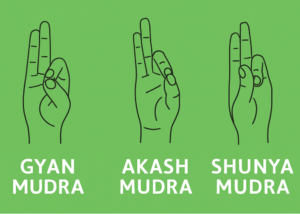
- Yoga Style: Calm, slow, and grounding yoga styles help bring stability and warmth to the body
- Best Poses:
- Child’s Pose: Calms the mind and creates a feeling of being steady.
- Mountain Pose: Builds a strong and stable base.
- Forward Folds: Calming poses that bring energy down.
- Warrior: Strengthens and grounds the body.
Pitta Dosha
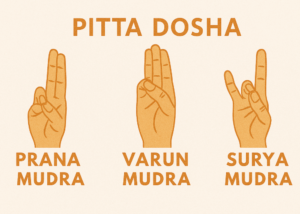
- Yoga Style: Cooling, relaxing, and non-competitive yoga helps to release heat and reduce inner fire. Avoid hot yoga
- Best Poses:
- Cat-Cow: Cools the body and calms the mind.
- Seated Forward Bend: A cooling pose that helps release body heat.
- Bridge Pose: Opens the chest and is good for the stomach area.
- Cobra Pose: Gentle backbends that release heat and tension.
Kapha Dosha
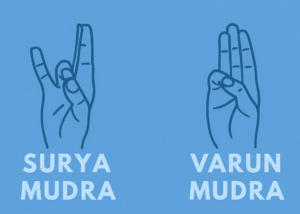
- Yoga Style: Energizing, fast-paced, and warming yoga helps to get the body moving and create heat.
- Best Poses:
- Sun Salutations: Builds heat and gets the body moving.
- Warrior Poses: Strong standing poses that create warmth and energy.
- Triangle Pose: Helps with energy and digestion.
- Dhanurasana (Bow Pose): Opens the chest and helps with sluggishness.
How do you manage Vata Pitta Kapha?
There are a number of things you can do to manage your dosha and maintain balance. These include:
- Diet: Eating a healthy diet is one of the best ways to manage your dosha. Vata people should eat warm, grounding foods, such as root vegetables and cooked grains. Pitta people should eat cooling foods, such as fruits and vegetables. Kapha people should eat light, easily digestible foods.
- Lifestyle: Lifestyle factors can also play a role in balancing your dosha. Vata people should avoid overstimulation and get plenty of rest. Pitta people should avoid excessive heat and competition. Kapha people should get regular exercise and avoid overeating.
- Herbal remedies: Ayurvedic herbs can also be used to help manage your dosha. Vata people can benefit from herbs such as ashwagandha and chamomile. Pitta people can benefit from herbs such as aloe vera and neem. Kapha people can benefit from herbs such as ginger and turmeric.
Here are some tips for managing each dosha type:
Vata
- Eat warm and grounding foods, such as soups and stews.
- Avoid cold, dry, and spicy foods.
- Get regular massages.
- Get enough sleep.
- Practice yoga and meditation.
Pitta
- Eat cooling and soothing foods, such as fruits, vegetables, and yogurt.
- Avoid spicy and oily foods.
- Avoid excessive heat and sun exposure.
- Get regular exercise, but avoid overexerting yourself.
- Practice pranayama (breathing exercises).
Kapha
- Eat light and warming foods, such as vegetables, fruits, and whole grains.
- Avoid heavy, sweet, and oily foods.
- Get regular exercise, but avoid strenuous activity.
- Practice yoga and meditation.
What is Pitta Kapha personality type?
People with a pitta-kapha personality type are typically intelligent, ambitious, and driven. They are also grounded and nurturing. They are often successful in their careers and relationships.
Pitta-kapha people tend to be good at managing their emotions and staying calm under pressure. They are also good at making decisions and solving problems.
If you have a pitta-kapha personality type, it is important to find a balance between your fiery pitta energy and your stable kapha energy. You can do this by practicing yoga and meditation, eating a healthy diet, and getting regular exercise.
Physique of the Doshas
Ayurveda teaches body type, or dosha, influences your physical look, habits, and how you think. Here are some examples;
Vata Physique
| Category | Vata Physique | Pitta Physique |
|---|---|---|
| Body Build | Light, thin, and often tall or short. | Medium build with good muscles. |
| Skin, Hair, Eyes | Dry, rough skin with visible veins. Hair is rough and thin. Eyes are small and do not shine. | Skin is soft and a bit red or pink. Hair is thin with a chance of early graying. Eyes are an average size with a strong look. |
| Digestion & Food | Hunger is not regular. Eats quickly. Likes warm food and drinks. | Strong hunger and eats regular, medium-sized meals. Likes cold food and drinks. |
| Energy & Activity | Quick movements and fast walking. Energy goes up and down and gets tired easily. | Has moderate stamina. Walks at a medium speed. Loves physical activity. |
| Mental & Emotional | Mind is quick and often changes. Learns fast but forgets easily. Becomes nervous and worried easily. | Mind is sharp and makes quick, stable decisions. Moods are steady but can get easily annoyed or frustrated. |
Kapha Physique
| Category | Vata Physique | Pitta Physique | Kapha Physique |
|---|---|---|---|
| Body Build | Light, thin, and often tall or short. | Medium build with good muscles. | Heavy and strong, with a large body frame. |
| Skin, Hair, Eyes | Dry, rough skin with visible veins. Hair is rough and thin. Eyes are small and do not shine. | Skin is soft and a bit red or pink. Hair is thin with a chance of early graying. Eyes are an average size with a strong look. | Skin is moist and smooth. Hair is thick and dark. Eyes are large, white, and shiny. |
| Digestion & Food | Hunger is not regular. Eats quickly. Likes warm food and drinks. | Strong hunger and eats regular, medium-sized meals. Likes cold food and drinks. | Eats slowly and has big, regular meals. Likes dry and warm food and drinks. |
| Energy & Activity | Quick movements and fast walking. Energy goes up and down and gets tired easily. | Has moderate stamina. Walks at a medium speed. Loves physical activity. | Slow to start but has very strong and lasting energy. Physical activities are slow and steady. |
| Mental & Emotional | Mind is quick and often changes. Learns fast but forgets easily. Becomes nervous and worried easily. | Mind is sharp and makes quick, stable decisions. Moods are steady but can get easily annoyed or frustrated. | Mind is calm and steady. Decisions are slow but very exact and stable. Handles stress easily. |
Ayur WakeUp Ayurvedic Resort Kerala
Ayur Wakeup Ayurvedic Resort Kerala is a luxurious resort that offers a variety of Ayurvedic treatments, including treatments for vata, pitta, and kapha imbalances. The resort’s experienced Ayurvedic practitioners can help you to determine your dosha type and develop a treatment plan that is right for you.
If you are looking for a way to restore balance to your doshas and improve your overall health and well-being, AyurWake Ayurvedic Resort Kerala is the perfect place for you.
